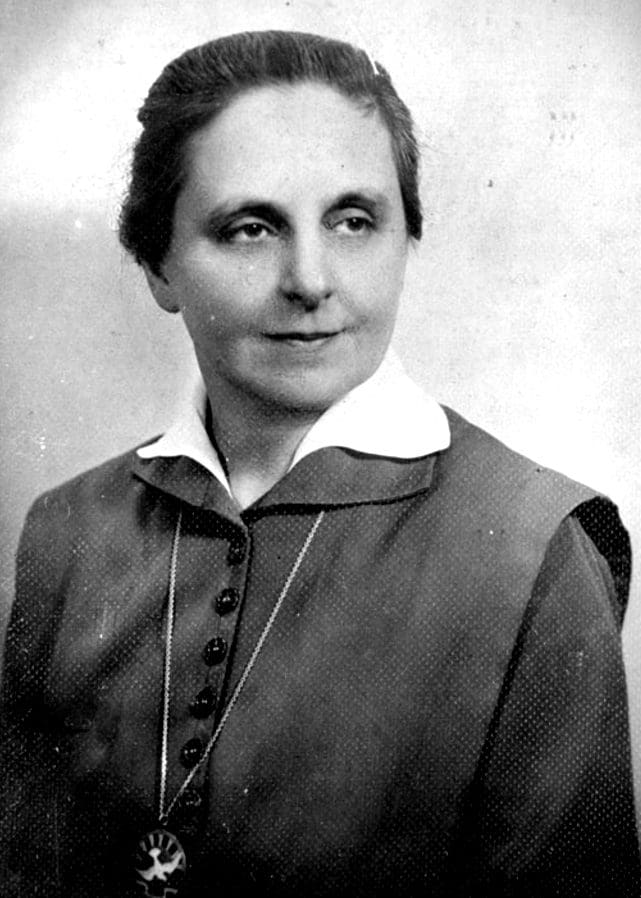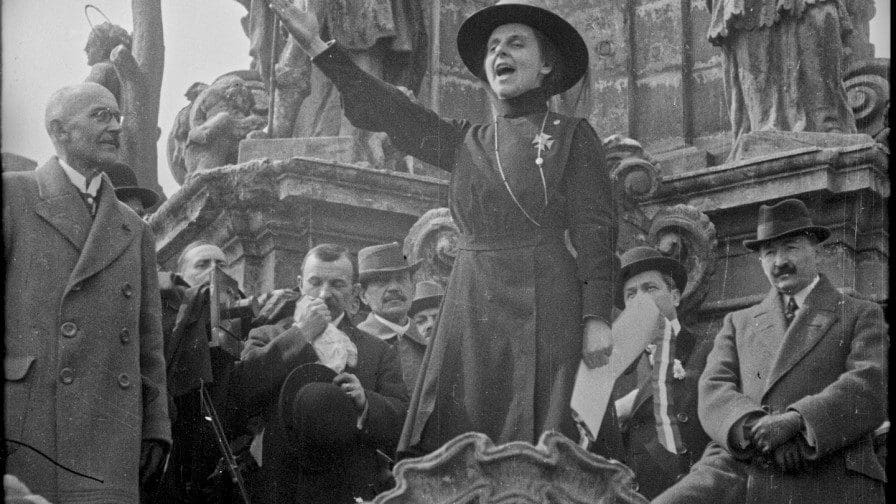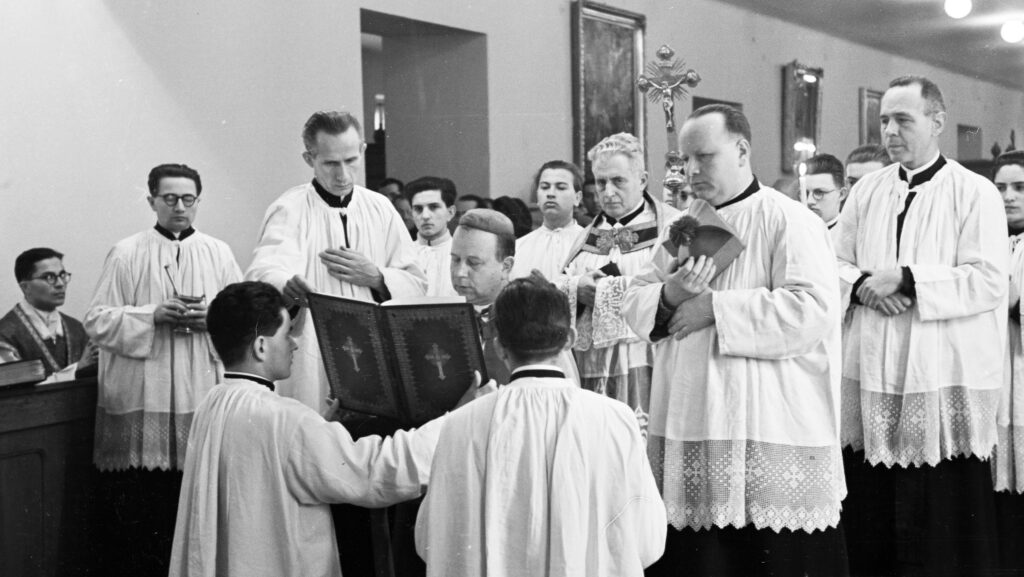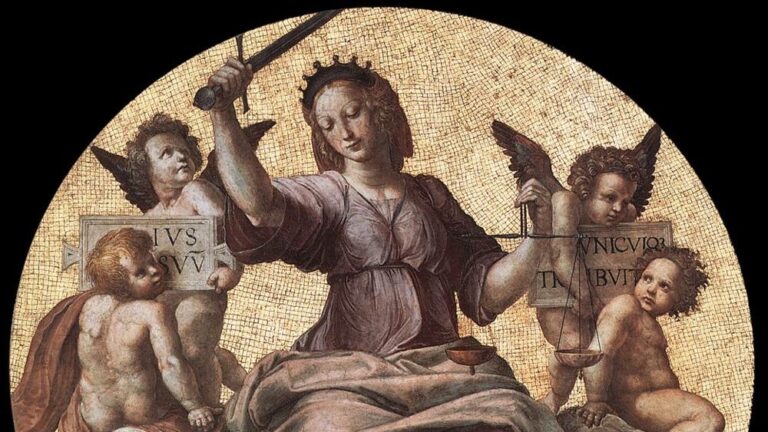The life story of Hungary’s first female Member of Parliament clearly reflects the tragedy of 20th-century Hungarian history. Margit Slachta was born in 1884 in Kassa (today’s Košice, Slovakia), which had been torn from Hungary by peace treaties concluding World War I.[1] She was actively involved in the organisation of Christian feminism in Hungary.
During World War II, she personally asked Pope Pius XII for help in saving people—in 1923, she founded The Society of the Sisters of Social Service (SSS), in the convents of whom countless persecuted people found refuge during the war. In 1946, she was the only one to vote against the break with the organic organisation of the state. Unable to cope after the communist takeover, she finally emigrated in 1949. She died in her monastery in Buffalo, New York in the United States in 1974, and her body could only return home in 2021. This paper does not analyse Slachta’s lifework in detail, however, it does not approach her vocation from the usual practical perspective, which focuses only on her political and monastic activities, but rather from the theoretical framework of her work. This study is primarily concerned with the question
what does a 20th-century Hungarian Catholic nun teach us and how did she, the first Hungarian female Member of Parliament, see the role of women?
The theoretical background of Margit Slachta’s activities is, of course, closely linked to her practical work, and cannot be entirely overlooked.[2] Slachta’s political activity can be divided into several phases (1918–1922; 1927–1944; 1945–1949), while her femininity and her role as a founding member and a sister of the SSS cannot be ignored as a kind of constant either. She became politically active, initially in the Christian Social People’s Party (and its predecessor) and later in the Christian Women’s Camp, and was elected the first Hungarian woman MP on 25 March 1920.

She was also a founding member of the Society of Social Mission, which was established in 1908 under the leadership of Hungarian Catholic nun Edith Farkas. However, her withdrawal from the organisation and the founding of a new one was partly to enable her to pursue her political role as a nun and to work for women’s equality as a Christian feminist.[3] The SSS was founded in 1923 as a religious women’s society in Budapest, whose members took private vows, and the spiritual life of the community drew on the Rule of St Benedict. To this day, the Society’s mission is to carry out charitable, social–religious, economic, public health, cultural and civic activities in the areas of children, women, and family protection. The Society thus enables its members to take an active part in public life: in contrast to the bourgeois liberal or radical feminism that dominated women’s movements in the first half of the 20th century,
Slachta and the SSS practised a so-called Christian-conservative feminism,
centred around Hungarian Catholic women, with special attention to the involvement of working women. Besides, Slachta’s work in creating schools should not be forgotten either: she opened a social school as early as 1915, and in 1937, she initiated the Catholic Women’s Social Training School as well.[4]
The SSS has also published several so-called women’s magazines, such as Nap (The Sun), Vasárnapi Harangszó (Sunday Bell), Keresztény Nő/Magyar Nő (Christian Woman/Hungarian Woman), Tulipános láda (Tulip Chest), Lélek Szava (The Word of the Soul), and Testvér (The Sister), mainly targeting the followers of the Catholic women’s movement.[5] These publications provided information on Margit Slachta’s philosophical viewpoint, as well as contained book recommendations and reviews; moreover, Slachta herself edited the Christian feminist women’s movement magazine Keresztény Nő.[6] For example, the work of Friedrich Wilhelm Foerster, the openly anti-Nazi German philosopher, was also recommended in them, both from a pedagogical and philosophical point of view, thanks to the influence of Edith Farkas. Besides, the Literary Committee of the Society of Social Mission also had the moral pedagogue’s books titled Lebenskunde (The Art of Life) and Lebensführung (Life and Character) translated and distributed, It also recommended the Society’s own publication, a 1920 book by theologian Dr Gyula Hetényi, titled The Women’s Question, which also dealt with the issue of women and politics. Hetényi referred to Foerster in one of his own works, too.
Slachta’s social and political–philosophical education was clearly demonstrated in her speech given on 31 January 1946, during the debate on the bill on the form of government of Hungary, which proved that she had considerable knowledge of political philosophy. Slachta considered the introduction of a republican form of government hasty and argued in favour of a monarchy.[7] In her speech, apart from the classical Hungarian conception of the state and constitution, the critique of Plato’s and Aristotle’s democracy also emerged, but she referred to the latter on other occasions as well. For example, in her discussion of the bill on the state ownership of certain industrial enterprises, she quoted from Aristotle’s work titled Politics, ‘Book 1’, on the moral significance of the state. Interestingly, she usually interrupted her own quotations of Aristotle with pithy interjections such as ‘old reactionary’ (referring to Aristotle).
In examining the background of the Catholic nun’s political and social philosophical thinking, we must also mention Catholic social teaching, since, in our view, Slachta’s thinking was significantly influenced by the so-called social papal encyclicals. During Slachta’s lifetime, between 1884 and 1974, there were seven popes—
her political and social philosophical thought was shaped primarily by the teachings of Pope Leo XIII and Pope Pius XI.
From the mid-19th century onwards, Catholic initiatives emerged across Europe to respond to the pressing social problems of the time. At the magisterial level, however, Leo XIII was the first pope to reflect on the social crisis. In 1891, he published his encyclical titled Rerum novarum on the labour question, which was the first papal social circular.[8] With this encyclical, he opened a series of documents of Christian social teachings ‘on which the Christian (Christian socialist and Christian democratic) parties of the 20th century built their political doctrine, or which, at least, are regarded as their theoretical–ethical foundation’.[9] The encyclical marked a major turning point in the Church’s approach to the labour question.
On the fortieth anniversary of the publication of the encyclical Rerum novarum, Pope Pius XI issued his circular titled Quadragesimo anno, in which he renewed and updated the teachings of Pope Leo XIII, and which is of similar importance to the Christian democratic and Christian socialist parties as the encyclical of reform of Leo XIII. In it, in addition to social reform, the Pope urged improvement in morality and perspective as well[10], and emphasised the principle of subsidiarity alongside social justice and social charity. Apart from launching a huge social movement, the encyclical of Pope Pius XI, just like Rerum novarum, was also one of the founding principles of post-World War II Christian democracy. However, the principle of subsidiarity has not only become part of the self-definition of Christian democratic parties, but through them, it is now an inseparable conviction at the very basis of the European Union, too.
Both Rerum novarum and Quadragesimo anno touch on the state of women in society; the work of Pope Leo XIII deals primarily with the situation of women workers. On the one hand, he states that ‘the effort which a healthy man of full age is able to make should not be demanded of a woman or child’. On the other hand, he looks at the role of women in a way that is appropriate at the time when he says that ‘certain occupations are less suited to women, who are called primarily to domestic work: such work is both a great safeguard of the dignity of the female sex and, by its very nature, is suited to the education of children and the happiness of the family’. But Pope Pius XI also reaffirms this classic social conception of the role of the mother in his work:
‘Mothers should work primarily at home and around the house, taking care of the life of the family. The practice whereby mothers are forced by the father’s low income to take up gainful employment outside the house, neglecting their specific duties, especially child rearing, is very bad and must be abolished by all means.’
These encyclicals can only be examined with due criticism from the perspective of 130 or 90 years passed in terms of social roles. However, it is only in the context of her own thinking that the progressive nature of Slachta’s approach really comes to the fore. In contemporary Catholic social teaching, like Slachta’s reasoning, women are essentially other than men, and this otherness is articulated in the papal encyclicals in relation to women’s role in the family. In contrast, the Catholic nun’s view of the female otherness goes beyond this approach. Although she also emphasises the dignity of the female gender,
for her the feminine otherness is the underlying motif of her thinking.
Thus, ‘women’ become a political–philosophical category for Slachta, which shows that women are not merely a practical issue for her, but the organising principle of her thinking about politics and society, determining her practical actions as well.
We can see this in her speeches in Parliament, too. In view of the limited space available, we would like to highlight only one speech from Slachta made in the National Assembly in 1920–1922[11], namely her speech on the bill on the extension of the scope of Act No 34 of 1921 to the end of June 1922 on the public charges to be borne and public expenses to be covered from 1 August to the end of December of the fiscal year of 1921/22. This was the first period after her election when the central theme in the National Assembly—despite the rejection of the amendment to the electoral law that also covered women—was the issue of women, the improvement of the position of women, and women’s equality within the land reform initiated by Secretary of Agriculture István Nagyatádi Szabó.[12]
Slachta’s speech was about amending the budget and economic issues—she examined the balance of public finances up to the Austro–Hungarian Compromise of 1867, looking at 53 years of budgets overall. Analysing public finances and the state of the economy, she saw the possibility of propagating women’s suffrage: ‘the Christian social programme’s demand for universal suffrage for women is justified above all in the financial collapse,’ she opined. However, this is not mere political vision or intrigue. Slachta’s linking of the economy and women’s suffrage stems from the realisation that women are intrinsically other than men.
In her speech, she stated, among others, that ‘the talents of men are different from those of women’, but she also immediately pinned down, thus departing from the Catholic social teaching of the time, that ‘it is a mistake to think that women have something to say only in the female sphere of work’. Slachta argued that the economy is a woman’s role after all, because women see not only numbers but ‘through numbers, people’, too. Therefore,
the otherness of women would be politically beneficial for the common good in budget planning and in maintaining public finances as well.
Thus, women’s otherness in economic matters was an important argument for her to prove the possibility of women’s political will and suffrage. But this, as we can see, is not merely a practical question. Behind the praxis is a theoretical concept, which we attempt to describe by asserting the category of women as a political–philosophical one, that is, the conception in which the otherness of women is the organising principle of thought.
It is evident, therefore, that Slachta believed that women have a special talent, perception and sensitivity, but this does not mean that they can only use their abilities and skills in areas other than that of women’s. In our opinion, if women can be defined as a political–philosophical category in the period, we will get closer to a more nuanced picture of the borderline between Christian and bourgeois liberal feminism. Besides, we can also go beyond Slachta’s classical presentation and offer a new perspective in which the first female Hungarian MP can be presented as a socially active and sensitive Catholic thinker.
In closing, we cite the following quotation from Slachta published in the Hungarian periodical Nemzeti Újság (National Newspaper):
‘A woman’s participation in the life of the state is not a plus in numbers but through the special powers of her individuality. Awakened to this, the women’s camp wants to participate in the great struggles now being waged by the Christian movement, not only as voters, but also as those who engage the forces of their feminine soul.’[13]
[1] Margit Balogh, ‘A “keresztény” feminizmus. Slachta Margit (1884–1974) életútja’, História, Vol. 5–6, 2000, pp. 56–59.
[2] Although Margit Slachta is not considered a theologian, her Christian theories were shaped by her studies at the Kalocsa School of Nursing, where she obtained degrees in German, history and French, but theological and religious education was also part of the curriculum.
[3] Ilona Mona, Slachta Margit, Corvinus Kiadó, Budapest, 1997.
[4] Margit Balogh, ‘Ínségakcióktól a politikai közéletig. Slachta Margit (1884–1974) szociális testvér pályaképe’, in Csaba Szilágyi (ed.), Szociális kérdések és mozgalmak Magyarországon (1919–1945), Gondolat Kiadó, Budapest, 2008, pp. 213–230.
[5] Nóra Lengyel, ‘Nemzetmentők és nemzetrontók. Nőképek az erdélyi katolikus nőmozgalom sajtókiadványaiban’, Múltunk, Vol. 4, 2019, pp. 200–239.
[6] Margit Balogh, ‘Slachta Margit, a “keresztény feminista”’, in Margit Balogh and Katalin S. Nagy (eds.), Asszonysorsok a 20. században, BME Szociológia és Kommunikáció Tanszék, Szociális és Családvédelmi Minisztérium Nőképviseleti Titkársága, Budapest, 2000, pp. 229–237.
[7] Ágnes M. Balázs, ‘A köztársaság ellenzéke: Slachta Margit érvelése a Nemzetgyűlésben az 1946. évi I. törvénycikk kapcsán’, Acta humana: emberi jogi közlemények, Vol. 1, 2017, pp. 39–50.
[8] Jenő Gergely, ‘A kereszténydemokrácia Magyarországon’, Múltunk, Vol. 3, 2007, pp. 113–154.
[9] Jenő Gergely, ‘A száz éves Rerum novarum’, História, Vol. 13, No. 5–6, 1991, pp. 3–4; cf. György Hölvényi, : A kereszténydemokrácia lehetőségei a 21. században, Kommentár, Vol. 1, 2021, pp. 83–92.
[10] Jenő Gergely, ‘A kereszténydemokrácia Magyarországon’, Múltunk, Vol. 3, 2007, pp. 132–134.
[11] Margit Balogh, ‘Slachta Margit a Nemzetgyűlésben, avagy az első női képviselő (1920–1922)’, in Gergely Jenő et al. (eds.), A hosszú tizenkilencedik és a rövid huszadik század. Tanulmányok Pölöskei Ferenc köszöntésére, ELTE BTK Új és legújabb Kori Magyar Történeti Tanszék, Budapest, 2000, 27−38.
[12] Éva Petrás, Boglárka Lilla Schlachta, Róbert Szabó (eds.), Slachta Margit beszédei a magyar parlamentben, Barankovics István Alapítvány – Gondolat Kiadó, Budapest, 2021.
[13] Nemzeti Újság, 1920. I. 13. 8.








